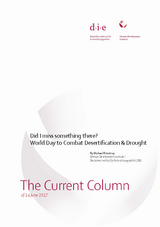Did I miss something there? World Day to Combat Desertification and Drought
Brüntrup, MichaelThe Current Column (2017)
Bonn: German Development Institute / Deutsches Institut für Entwicklungspolitik (DIE) (The Current Column of 14 June 2017)
Bonn, 14 June 2017. World days are a lot like Catholic saints and UN organisations – there is one for everything. They are subject to trends, cycles and political wrangling. The twin issue of desertification and drought could be about to experience a renaissance. The World Day to Combat Desertification and Drought has only been around since 1995. It is the counterpart to the United Nations Convention to Combat Desertification in Those Countries Experiencing Serious Drought and/or Desertification, Particularly in Africa (UNCCD), also adopted in 1994. The UNCCD itself is one of three conventions that emerged from the Rio Earth Summit in 1992, the other two being the United Nations Framework Convention on Climate Change (UNFCCC) and the Convention on Biological Diversity (CBD). Germany and Bonn have a special connection to this topic, as they have played host to the UNCCD Secretariat since 1999. Desertification was a particularly sensitive issue at the time. As the German Advisory Council on Global Change (WBGU) declared on World Day to Combat Desertification and Drought in 1996: “The WBGU believes that the trend of desertification and soil degradation observable around the world will have far more tangible consequences over the next two to three decades than global climate change.” But not long after their adoption, things went relatively quiet on the convention and World Day front. Desertification and drought were seen primarily as issues in and for poor countries, issues that industrialised nations had apparently either moved on from or had under control. At that time, it was the southern spread of the Sahara that became emblematic of desertification, not the Dust Bowl of the American Midwest. The broader definition of (soil and grassland) degradation was not chosen, although it often better describes the type of processes which the convention is intended to counteract. The reduction of the definition to arid and semi-arid locations excluded many countries in the temperate zone. Consequently, the choice of wording for the convention restricted its thematic and geographical scope in a way that was not conducive to promoting the global relevance of the topic. The fact that, on a surface level, the effects of desertification and drought are primarily local in nature is also detrimental when it comes to securing global support. Degraded soils, dying cattle and reduced agricultural production are localised issues and, from a cynical point of view, even create demand and competitive advantages elsewhere. Ultimately, the fight against desertification and drought is first and foremost a local issue; in fact, the UNCCD is particularly geared towards the production of action plans from the bottom up. This is a challenge even in developed nations and one of the reasons that approaches to soil protection and drought management are not very highly developed in rich countries either. And this can also be disadvantageous for an international agenda such as the UNCCD. The multi-sectoral plans lack a natural lead ministry that would readily go beyond its own mandate to adopt the whole agenda. This leaves the brokering ministry, often responsible for the environment or agriculture/forestry, with a weak negotiating position at international level. Equally, providing international funding for such plans is no easy task, precisely because there is no dedicated ministry to implement them and territorial/integrated approaches are rare due to the sectoral distribution of donor activities. This explains why the topics of desertification and drought failed to take off in a big way. They were unable to gain traction in the individual countries concerned and were characterised at international level by disinterest, management problems and North-South distribution conflicts. The UNCCD became the poor relation of the Rio conventions. However, changes in the international context could give rise to a renaissance for the topic. Agenda 2030 pools the issues of soil conservation and biodiversity within SDG 15, raising their profile and lending them coherence. It also brings greater clarity in terms of the correlation between desertification and soil degradation, species decline and greenhouse gas emissions. Internationalising specific measures to a certain extent, such as investor-led reforestation initiatives financed by climate funds, raises their profile and encourages greater diligence at international level, as well as bringing new actors on board. Climate change exacerbates drought and changes in regional vegetation patterns. Even where it is not leading to starvation, it is creating unprecedented economic and environmental problems, not least in wealthy countries. And drought and environmental degradation are (once more) increasingly being seen in the South as playing a part in the destabilisation of populations and entire nations. Any resulting terrorist movements and migration flows will ensure that these issues are recognised as international problems if this is not already the case. Incidentally, the dictionary of Catholic saints offers five individuals to help combat drought: Armel of Brittany, Gerard of Csanád, Hugh of Novara, Isidore of Madrid, and Odo of Cluny. Maybe many people do help a lot sometimes. But in the real world let us coordinate our efforts.


